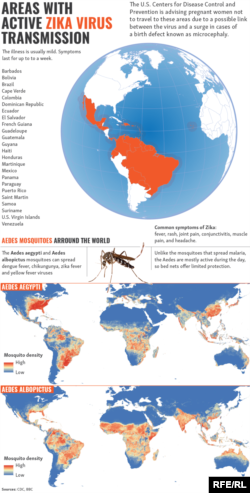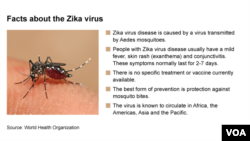Doctors, public health experts and women's rights organizations are concerned that the strongly suspected link between the Zika virus and microcephaly, a fetal deformity resulting in a shrunken head and a damaged brain, will cause women in the Americas to seek illegal abortions.
Some countries in Latin America have opted to advise women to delay becoming pregnant, rather than make abortions more readily available.
Poor women in these countries have little access to family planning and many cannot even afford to buy insect repellent to help avoid the mosquito-borne virus.
The virus has mainly hit Brazil, a predominately Catholic country. Botched abortions in clandestine clinics are already a major cause of maternal death in Brazil.
Daniel Becker, a pediatrician and a public health expert in Rio de Janeiro told Reuters, "Zika is a health catastrophe and a terrifying menace for pregnant women. People will look for an abortion."
Emergency meeting
The World Health Organization is holding an emergency meeting Monday to to decide whether the Zika threat should be rated a global health crisis.
The link between Zika and microcephaly is strongly suspected but has not been definitively proven. The cause of the deformity is under investigation.
In Brazil, the incidence of the normally rare birth defect is now 10 times higher than normal.
There is no vaccine for Zika.
"The real problem is that trying to develop a vaccine that would have to be tested on pregnant women is a practical and ethical nightmare," Mike Turner, head of infection and immunobiology at the Wellcome Trust, told The Guardian newspaper.
The WHO, U.S. Centers for Disease Control and Prevention, and the Pan American Health Organization warn the Zika virus is spreading rapidly through the Americas and could affect as many as 4 million people.
Dr. Peter Hotez told the Examiner newspaper that the Zika outbreak in Brazil poses a "far greater threat to the United States than Ebola," A Zika outbreak has "never been seen on this scale," Hotez said, despite its prevalence in Africa, Asia and the Pacific islands.
Zika is a viral illness spread from human to human through the bite of a mosquito.
Virus carriers
Two species of mosquito are known to carry the virus, the Yellow Fever mosquito and the Asian Tiger mosquito.
Both species are found throughout most of the Americas.
The Yellow Fever mosquito can be found along the Gulf Coast of the United States while the Asian Tiger mosquito can be found as far north as New York City.
Health authorities in several Asian countries have advised travelers, particularly pregnant women, to avoid trips to Central and South America.
Travel warning
The U.S. Centers for Disease Control and Prevention also has warned pregnant women against traveling to areas with Zika virus outbreaks.
Factbox: Prevent the Spread of Zika
The Zika virus is spread through mosquito bites and there are no vaccines to prevent the spread and no drugs to treat those affected.
If you are traveling to countries where the Zika virus is found, take the following precautions:
*Wear long-sleeved shirts and long pants.
*Stay in places with air conditioning or that use window and door screens to keep mosquitoes outside.
*Sleep under a mosquito bed net to protect yourself from mosquito bites.
Use Environmental Protection Agency-registered insect repellents.
*Always follow the product label instructions.
*Reapply insect repellent, as directed.
*Do not spray repellent on the skin under clothing.
*If you are also using sunscreen, apply sunscreen before applying insect repellent.
If you have a baby or child:
*Do not use insect repellent on babies younger than two months of age.
*Dress your child in clothing that covers arms and legs, or
*Cover crib, stroller and baby carrier with mosquito netting.
*Do not apply insect repellent onto a child's hands, eyes, mouth, or cut/ irritated skin.
*Spray insect repellent onto your hands and then apply to child's face.
Source: The Centers for Disease Control and Prevention
They have asked people coming or returning from those areas, who display symptoms such as fever and rashes to immediately report to health centers. Doctors are also required to immediately report suspected cases.
Faced with the Zika outbreak, the presidents of the United States and Brazil have agreed on "the importance of collaborative efforts" to combat its spread.
Barack Obama and Dilma Rouseff recognize the significance of working together "to deepen our knowledge, advance research, and accelerate work to develop better vaccines and other technologies to control the virus," the White House said.
In the meantime, Brazil has turned to a British company, Oxitec, for help. According to The New York Times, Brazil recently approved the release of multiple groups of genetically modified Aedes Aegypti mosquitoes, created by Oxitec, throughout the country.
The idea behind the release of the mosquitos is for the mature modified males to mate with females.
Their offspring who inherited the modified gene would die, causing the mosquito population to dwindle and, hopefully, lower the threat of the disease.
The WHO says the virus has grown rapidly to a public-health threat of "alarming proportions."
Julius Lutwana, a virologist at the Uganda Virus Research Institute, told VOA Zika was long thought to pose only a small risk to humans.
Symptoms
The WHO says people with the Zika virus have a mild fever, skin rash and conjunctivitis (red eye), with symptoms lasting between two to seven days. The best prevention against Zika virus, experts say, is protection against mosquito bites.
Outbreaks in Brazil, which reported its first Zika case in 2015, and elsewhere in southern and Central America have led to extensive spraying of insecticides to eradicate mosquitoes.
The WHO's regional office in the Americas said the most effective ways to stop the virus from spreading are to reduce mosquito breeding sites and for people to protect themselves from bites with insect repellent, nets, screens and clothing that covers as much of the body as possible.
WATCH: Related video on Zika virus










